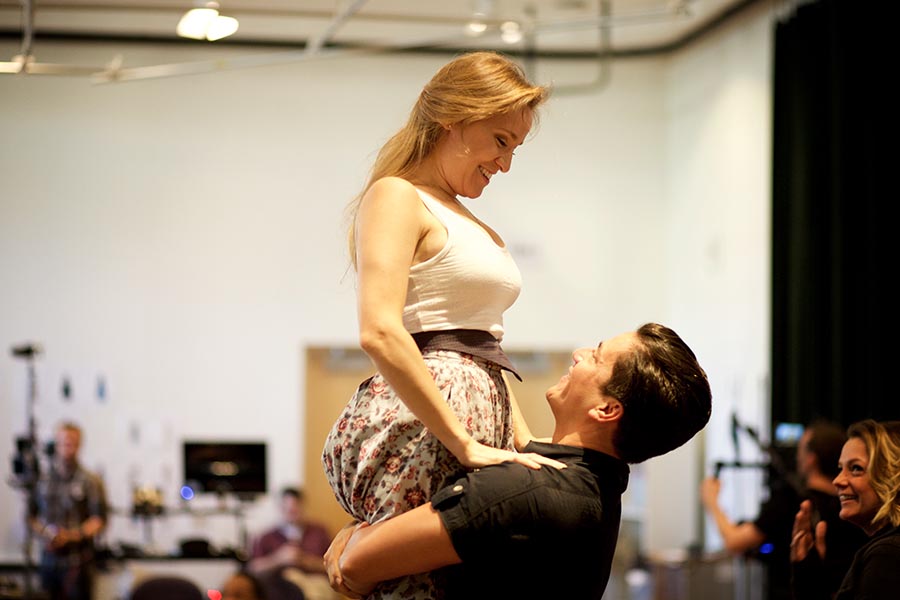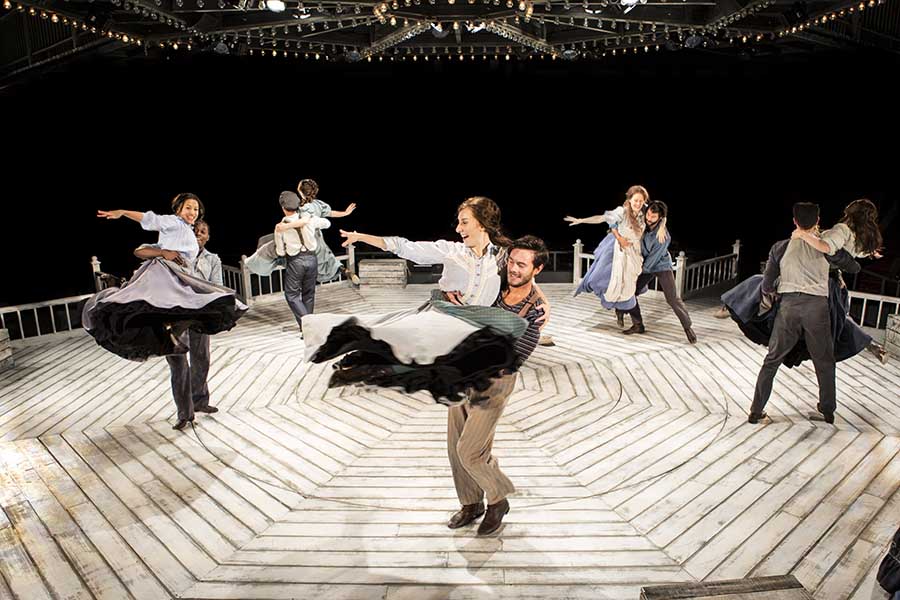Center stage was the wrong place for the star to stand.
Kate Rockwell was poised in the middle of Arena Stage’s Fichandler Stage, her clear soprano coasting through “Mr. Snow,” a dreamlike ballad in Rodgers and Hammerstein’s Carousel. But despite Rockwell’s prime blocking, there was a problem.
“I can’t hear the orchestra,” Rockwell said, voicing her concerns to conductor Paul Sportelli once she had finished her number.
Thankfully, Arena Stage had hired a record number of tech staff for this wandelprobe, the splendid, German-sounding name for the first rehearsal of a musical that takes place onstage with an orchestra. This Carousel, which began performances Oct. 28, 2016, and ran through Dec. 24, was in some ways the theatre’s most ambitious ever. Every holiday season since 2010, when Arena Stage opened its renovated Mead Center for American Theater, the Tony-winning company in Washington, D.C., has mounted an American musical in “The Fich,” as the in-the-round space is known. Without a traditional pit below a proscenium, the orchestra has been stashed away in all sorts of places: below stage on one end for Oliver!, above seats on the other for Oklahoma!.
For Carousel, Arena wanted to try pretty much the only configuration it hadn’t yet attempted: above the stage, in a cupola built to resemble a seaside pier.
“What we are doing is quite adventurous technically,” artistic director Molly Smith said after the rehearsal. “We’ve been talking about it for months, but we really didn’t know if it would work.”
After Rockwell drew attention to her acoustic challenge, five techies sprung into action. It turns out there was a dead space right below the cupola at center stage. Volumes were tweaked. Blocking was adjusted. Compromises were made. In the end, the problems were surmountable.
“I was really relieved,” Smith said.
In addition to the creative orchestral configuration, Arena’s staging of Carousel was novel for two more reasons: One, it included no props, with one notable exception, and two, those lone props were the glowing orbs carried by the Starkeeper and Heavenly Friend characters, both of whom were played by teenagers to deepen their sense of innocence.
Smith explained these risky idiosyncrasies at Carousel’s first rehearsal on Sept. 28, 2016.
“This definitely has that first day of school feeling,” Smith said to cast, crew, and creative members assembled in the Fich’s north side. In an impassioned speech, she shared her vision for a Carousel that would, aesthetically speaking, bear very little resemblance to the 1956 candy-colored film. But she used her unconventional space to justify her unconventional approach.
“This is the greatest space in the world to reinvent the gold standard musical,” she said.
Smith’s “reinvented” musicals have included both hits and critical misfires. “Mollyizing,” is the term Washington Post critic Peter Marks has coined to describe her approach to the classics. No other musical has matched the success of her Oklahoma!, which featured African-American actresses in the roles of Laurie and Aunt Eller, drawing on historical records indicating that freed blacks were among the early settlers of what was formerly known as Indian Territory.
“At first I was concerned because Arena was calling it, Not Your Mother’s Oklahoma!,” Theodore S. Chapin, the president and chief creative officer of Rodgers & Hammerstein, told The New York Times. “But the casting and the production as a whole made it feel contemporary without anyone having to say, ‘Look, it’s contemporary!’”
Although the rumored Broadway transfer never came to pass for Oklahoma!, the production was so well received in Washington that Arena remounted it during the summer of 2011. The success of Oklahoma! cemented the holiday musical as a tradition at Arena Stage, and for many Washingtonians. Like A Christmas Carol at Ford’s Theatre, it’s become an event that can attract patrons who will only go see a show around the holidays. And Arena Stage—a theatre that for decades prided itself on producing new American plays—now plans its nearly $19 million annual budget around making bank Christmas.
Still, some holiday musicals have proven more popular than others. The original run of Oklahoma! remained Arena’s biggest box office success until the theatre mounted Fiddler on the Roof in 2014, at which point that production become the theatre’s highest grossing show in Arena’s 65-year history.

Oliver!, the 2015 holiday installment, did not fare nearly as well, in part because Smith’s reinvention tactics alienated both families with young children and D.C. critics. Overhead catwalks, evidence of crack and lots of clinking chain belts kept things creepy, and Smith’s darkly punk, drug-filled staging ended up more akin to a Neil Gaiman novel than a heartwarming musical.
Arena needed a holiday rebound, so Smith returned to Rodgers and Hammerstein, but didn’t shy away from “reinventing” the story of bad boy carnival barker Billy Bigelow and his “queer one” beau, Julie Jordan. To create a seaside town devoid of props and sets, she made a point of assembling a creative team that would help her emphasize the music, text, and gestures.
Music director Sportelli wasn’t just charged with directing an orchestra split between a cupola and a small pit, he re-orchestrated the charts for only 12 musicians, a pared-down combination that the Rodgers and Hammerstein estate was allowing for the first time. Smith met Sportelli in 2011, when she directed My Fair Lady at Ontario’s Shaw Festival. She remounted the production at Arena in 2012, bringing down her Henry Higgins and members of the Shaw creative team, including Sportelli. Ever since, Sportelli has been ducking out a bit early from his main gig as the festival’s music director to do the holiday show at Arena Stage.
The Shaw Festival focuses predominately on the classics, and Smith, fresh off of directing Our Town in Niagara-on-the-Lake, also borrowed from the ethos of classical acting to mount Carousel. At her first rehearsal, she introduced the cast to Anita Maynard-Losh, calling the text director her “secret weapon.” Maynard-Losh was charged with helping the cast achieve the clarity of meaning associated with Shakespeare, while Lynn Watson served as dialogue coach for the New York, Irish, and Downeast Maine accents.
And finally, to figure out how to stage Carousel without knives, cards, and clambake accouterments, Smith praised movement director David Leong, and explained her rationale for directing a prop-less musical.
“Somehow it feels right with the mythic nature of the story—and to remind us that this isn’t reality TV,” Smith said, adding that she had been inspired by the minimalism of Our Town, and thought that relying on mime in a musical would “wake up imaginations” for both cast and audiences alike.
Initially, however, even Leong had been skeptical of the idea. “I was thinking, ‘How in the world is this going to work?’” he recalled in an interview. “The props are important…My brain went to a practical place, so I had to zoom out and look at the big picture…When I went big and saw what (Smith) wanted to do, I said, ‘I’m on board, and I like this. I like challenges.’
“If someone comes to me, and I don’t know the answer, that, at this point in my career, that excites me more than anything else,” he continued. “There’s a lot of work out there for fight choreographers—I’ve done about eight Romeo and Juliets—but I don’t like doing the same thing over and over again.”
Leong, a collegiate gymnast, trained with several Marcel Marceau disciples after graduating from the University of New Hampshire and began his own career teaching theatre movement and fight choreography in 1977. Since 1996, he has served on the theatre faculty of Virginia Commonwealth University, and logged many hours on I-95 driving from Richmond to Washington. He’s worked at theatres across the capital region, but many of those trips have been to Arena Stage.
“I have so much respect and admiration for Molly,” Leong said. “Unless I was on my deathbed or in Singapore, I would pretty much say yes to whatever she wants.”
Even choreographing a show without props. Smith had surprised him with the request, but once rehearsals got underway, it was Leong’s turn to surprise her. The director had assumed that the cast would begin rehearsing with props, then subtract props and continue miming—she said as much at her first-day-of-school speech.
But she was wrong.
“Most things don’t transfer,” Leong explained. He gave the example of how he teaches actors to pick up cups, like the scene where Billy (Nicholas Rodriguez) accepts a cup of coffee from Julie (Betsy Morgan). To accept an actual cup, Rodriguez would already have his hand curved before the pass off, but that would prevent the audience from seeing the exchange. To mime the action, he had to hold his hand out straight, then curl his fingers around the imaginary cup. Morgan, likewise, needed to flatten her palm as soon as Rodriguez took the “cup” from her hand.
But there were many other scenes that featured gestures Leong had either never tried, or had never tried to integrate with spoken word. “They don’t usually work well together,” he said. “I wasn’t sure how they could live in the same world.”
To figure that out, Leong made a list of sequences in Carousel that would require miming, and workshopped them with his VCU graduate students. What he ended up doing was asking his students—and then the Arena Stage actors—to mime the scenes without using words.
“I had to make sure that the story was told, and the gestures had to be so clear, things like smoking a cigarette, or lifting a coffee cup,” he said. “The card game was really tough to do, because the gestures are so small.”
In Act II, Billy plays Blackjack with the devious boatman Jigger Craigin while they lie and wait to rob the captain. While Rodriguez had some experience with cards, Kyle Schliefer, who played Jigger, couldn’t even deal, so Leong had to allow some rehearsal with props.
“I was really proud of that one.” Leong said of the resulting scene.
All too soon, it was time for the cast to begin its two-week run of previews. Between that first preview on Oct. 28, 2016, and the Nov. 10 opening, Smith made many changes. Most involved the musical numbers. For example, she had choreographer Parker Esse make sure the actors were on the move as they entered each song, so it didn’t look as if the actors were standing around waiting for the music to start.
Other tweaks involved how the cast arranged the lobster crates and traps that served as the only set pieces. The wooden boxes were arranged into various configurations throughout the show, including a coffin, a card table, and various benches. Once some of the technical challenges from the musicians’ configurations were solved, Smith was also able to move some action back toward the center of the stage, to the place where Rockwell couldn’t hear during the wandelprobe.
Perhaps most important, Smith had the orchestra reprise “June Is Bustin’ Out All Over,” rather than “You’ll Never Walk Alone” during the curtain call. The original idea was “just too somber,” she decided.
Making the ending a bit more optimistic helped counter the biggest change faced during the preview period: the Nov. 8, 2016, election of Donald J. Trump as the President of the United States.
No doubt the coming transition of power weighed heavily on the opening night crowd, which included six foreign ambassadors and dozens of journalists. When The Washington Post‘s Marks left the Fich that November evening, he felt the closest thing he could to a sense of relief.
“In the gospel according to Richard Rodgers and Oscar Hammerstein II, you’ll get through whatever hardship lies in your path if you face it head-on, in optimistic fellowship,” Marks wrote, going on to describe the production as “pristinely inspirational” and “melodically transporting.”
Despite the strong review, Carousel wasn’t a box office juggernaut. On average, the musical played to a house that was 82 percent full, and clocked a total attendance of 37,020. Arena Stage opted not to extend the production into January.
But a spirit of optimism while walking through a storm continued to pervade the cast throughout the run. And perhaps it’s a testimony to Smith’s belief in Carousel as a “gold standard” musical, the Hamlet of the canon, that a new production of the show will be remounted on Broadway next year. In New York, it will be opera star Renee Fleming singing “You’ll Never Walk Alone.” If anyone who saw the Arena Stage production also catches the new Broadway staging, they will likely be reminded that in a good production of Carousel, that sentiment will always ring true—even if the actors do walk without props.













